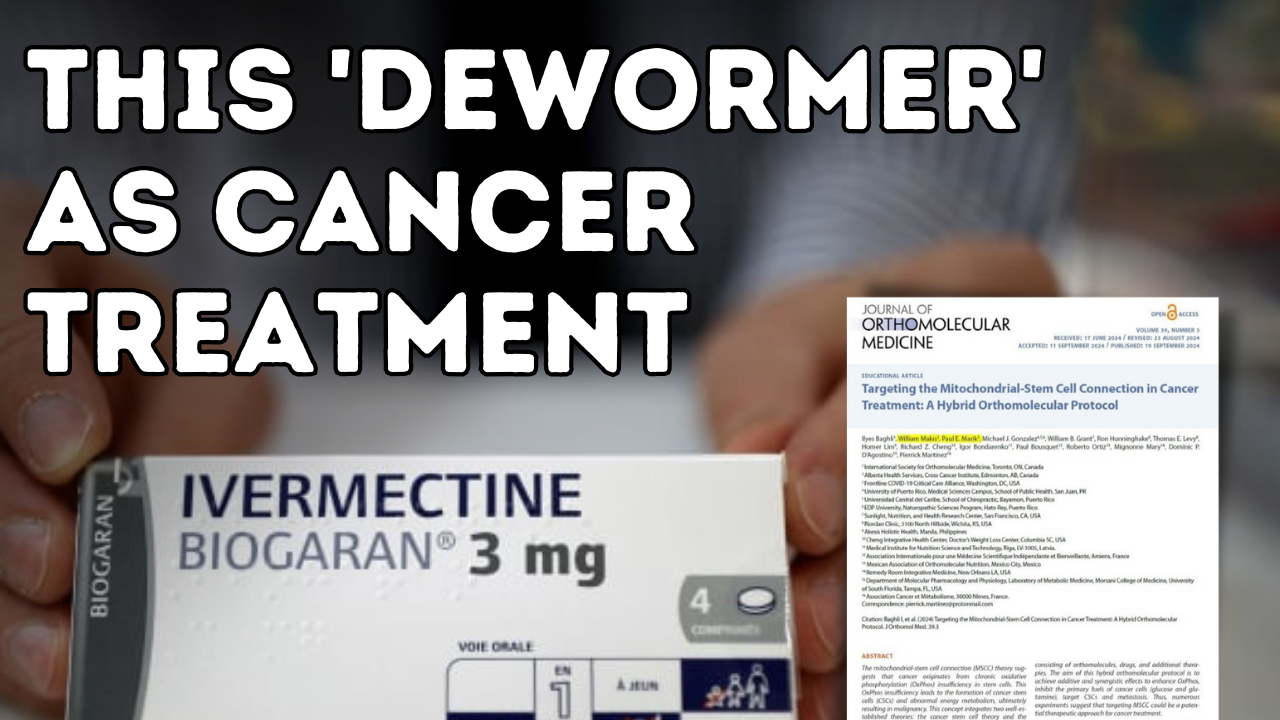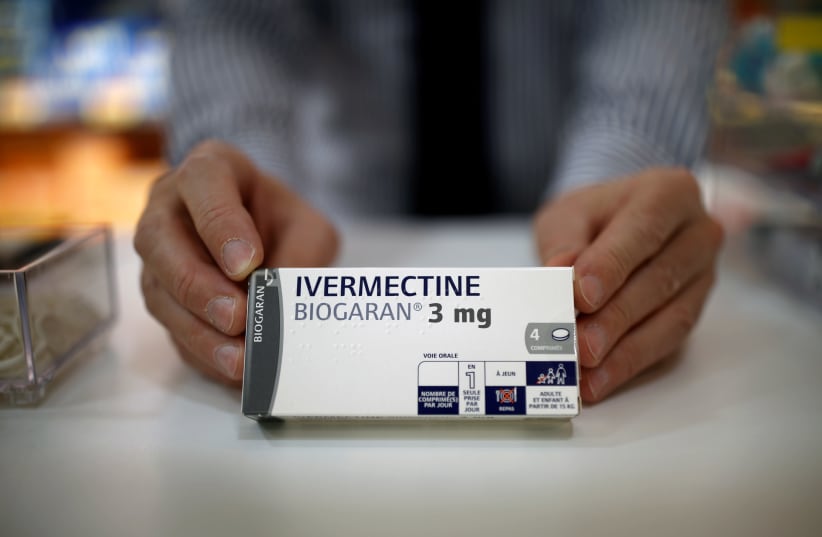Newly Published Study: ‘Dewormer’ as a Potential Cancer Cure

Would You Consider Chemotherapy for Your Pet’s Cancer?
If your dog or cat were ever diagnosed with cancer, would you consider chemotherapy? Yes, it’s still the most commonly recommended medical option, but it rarely leads to a cure and often comes with significant side effects.
Exploring Alternatives
In today’s newsletter, I’m sharing a newly published study on animal dewormers as potential cancer treatments. But that’s just one option. There are many other holistic approaches worth considering.
Holistic Cancer Prevention
Think prevention. Antioxidants, essential fatty acids, 95% curcumin, probiotics, colostrum, and immune-boosting mushrooms are powerful tools to support your pet’s health.
Dr. Jones’ Ultimate Canine ADVANCED Health Formula
All of these key nutrients can be found in my Ultimate Canine ADVANCED Health Formula. It makes it easy to give your dog the daily support they need, even before any problems arise.

For Cat Owners: Upcoming Webinar
If you’re a cat person, I encourage you to sign up for my upcoming Cat Health and Nutrition Webinar, where I’ll be sharing my top remedies for feline cancer.
Click here to sign up: Dr. Jones’ Cat Health and Nutrition Webinar


BREAKING NEWS: First-in-the-World Ivermectin, Mebendazole, and Fenbendazole Protocol for Cancer Published (Sept. 19, 2024)
I’m excited to share groundbreaking news in the world of cancer treatment. A peer-reviewed paper has been published, discussing a novel treatment protocol using animal de-wormers like Ivermectin and Panacur (Fenbendazole) for targeting cancer cells.
This paper highlights a potential alternative pathway for cancer treatment, utilizing these common dewormers. While no specific treatment regimen is provided in the study, I have been working on possible regimens for treating cancer in pets with these medications.

Fenbendazole (Panacur) Dosing for Cancer in Pets

You may have heard the story of Joe Tippens, who famously used Fenbendazole (a common animal dewormer) to recover from cancer. This has sparked interest in using Fenbendazole for treating cancer in pets, particularly dogs.
Here’s a possible regimen I recommend:
For dogs, the typical dose is 50mg per kilogram of body weight, administered in a cycle of three days on, four days off. For example, a 22-pound (10 kg) dog would receive 500mg (or 5cc of the liquid Panacur) for three days, followed by four days off. Continue this cycle for 30 days and assess if there is any improvement.
Ivermectin Dosing for Cancer in Dogs

Now, let’s discuss Ivermectin dosing. Ivermectin is another promising dewormer in cancer treatment. The standard dose for dogs is 200 micrograms per kilogram (or 0.2 milligrams per kilogram of body weight).
For example, a 22-pound (10 kg) dog would need 2 milligrams of Ivermectin. I recommend using a small insulin syringe for accurate dosing, particularly for small dogs. Administer this dose orally once a day for 30 days and assess the results.
Important Note:
Always consult your veterinarian before starting any new treatment, especially one like Ivermectin, which is primarily used for other conditions. It’s crucial to ensure that your dog is not a Collie or herding breed with the MDR1 gene deficiency, as these breeds can react negatively to Ivermectin.
This is a monumental step forward in cancer treatment options for pets. Seeing a published, peer-reviewed study that highlights Ivermectin and Panacur as potential cancer treatments is incredibly exciting.
Heal Your Pet At Home!
P.S. Prevention is always better than treatment. You can support your pet’s health with my Ultimate Canine ADVANCED Health Formula—a scoop a day covers so many beneficial nutrients.
P.P.S. Don’t miss out on our upcoming Cat Health and Nutrition Webinar! Last time, seats sold out fast. If you’re interested, I highly recommend signing up early to secure your spot.
Sign up here: [Dr. Jones’ Cat Webinar]

Can ivermectin injected into a tumor help break down hematoma sarcoma? Or is oral dosing preferred? We are fighting a rapidly growing tumor.
Injecting ivermectin directly into a tumor is not a standard practice and could carry risks without established benefits. Oral dosing is more common for its approved uses
I was wondering the same thing and researching just for this. Any findings?
Ivermectin is not typically used to treat tumors like hematoma sarcomas, and injecting it into a tumor is not a standard treatment.
Oral dosing of Ivermectin is not a standard treatment either, to be fair.
Pet dose of 1mg (0.1cc) per 10lbs daily for a minimum 30 days and assess response.
Should I use both of these dewormers at the same time for treatment??
They have the same effect; just use one of them.
This is not totally true, I have a chart that checks off what actions ivermectin, fenbendazole and mebendazole have on cancer. They are not all the same.
I have a 15 year old cat that has small cell lymphoma of the small intestines. She has been on chemo (chlorambucil) for a few months and doing well (most recent ultrasound – resolved intestinal thickening). I came across the Fenbendazole treatment after starting the chemo. She also takes Prednasalone, Cerenia, Pepcid, and a monthly B12 shot.
She was vomiting and not eating prior to cancer diagnosis. The vet recently lowered the dose of Prednasalone and she is eating a little less so I have given her Mirtazapine occasionally.
Can you advise what I should do?
Check this helpful article:
Cancer rates appear to be rising in our animals. I personally have had 2 dogs and 1 cat die of cancer… I have diagnosed WAY too many pets with Cancer.
Omega 3 Fatty Acids are one of the few supplements documented to help support the immune system, and potentially prevent some of the cancers.
I have many pet parents reporting this is helping their pet, and on a personal side I am now on them daily as well!
If you have yet to try them, they are definitely worth a try… Dr Jones’ ULTIMATE Omega 3 Supplement for Dogs and Cats
Here are some rather startling Cancer Facts – Canine Cancer affects one out of every three dogs. Of those, over half of them will die of cancer.
80 million – the number of dogs in U.S.
27 million- the number of dogs that will be diagnosed with cancer
14 million – the number of dogs that will die of cancer in the U.S.
Cancer is affecting way to many of our pets.
One of the cancers I saw far too often in veterinary practice was Lymphoma- and still today chemotherapy can NOT cure this… .
7 Alternative Cancer Treatments you may not be aware of
1. Dandelion Root
Dandelion root tea tincture, championed by an elderly leukemia patient, has sparked exciting cancer research at the University of Windsor.
There have been multiple anti-carcinogens isolated from Dandelion Root.
The home treatment involves purchasing dried dandelion root, grinding it in a coffee grinder, adding in teaspoon/20lbs of body weight to 1 cup of water, and simmering that for 20-30mins.
Allow to cool and then this is given to your pet with cancer daily.
If it is to help, most people see a response in 2 weeks.
2 .Panacur for Cancer
Joe Tippens story, cancer spread, no chance to live… a vet suggested taking fenbendazole… Joe was given NO chance to live, and was cleared of cancer in 4 weeks
Since this has been published, other reports of people finding success with some types of cancer, and may also be able to help our dogs and cats with cancer
There is research showing how fenbendazole destabilizes part of the cell walls of cancer cells leading to cell death.
Doses for deworming 50mg/kg once daily for 3 days. Liquid is 100mg/ml concentration.
Regimen for cancer is 50mg/kg once daily for 3 days on/ 4 days off.
I would suggest trying it for a month to see if your pet will respond.
Antioxidant/Flavonoid Supplement
One study in animals found this was MORE effective when used with a supplement of antioxidants/flavonoids… likely better then to supplement at the same time with something like Dr Jones’ Ultimate Canine Advanced, or a mixed flavonoid supplement that includes to flavonoid from Green Tea, ECGC.
3. Medical Marijuana: THC and CBD oil- natural anti-inflammatory, can help with cancer.
When my Black Lab Lewis was dying of mouth cancer, he ONLY responded to CBD/THC tincture.
I was able to get a 4:1 tincture- 4 parts CBD, 1 part THC. There has been extensive research showing positive benefits of THC and CBD for many of the common cancers. At the very least it is wonderful for pain control.
Dose of 3mg/10lbs twice daily based on the CBD concentration.
4. Medicinal Mushrooms
Turkey Tail (Coriolus versicolor): studied for colon cancer in people, proven immune boosting. It has extensive research in Japan, and now is classified as a medicinal treatment for colorectal cancer. Few to no side effects, and works well in conjunction with chemotherapy drugs.
Studies are showing a marked decrease in cancer recurrence for people that take Turkey Tail mushroom long term after cancer treatment.
Dose of 100mg/10lbs daily.
Reishi
Other medicinal mushrooms are also VERY important, and IF your dog is to have Lymphoma, then you should be considering REISHI mushroom. Several studies have shown it to be the most beneficial medicinal mushroom for Lymphoma.
The Reishi dose is 100mg/10lbs once-twice daily.
5. Ivermectin for Cancer. Another animal dewormer that was highlighted as a potential treatment for COVID 19. Current studies showing it to be beneficial for an array of cancers. There are no published animal doses for cancer, but it is used extensively in dogs/cats for parasites.
Dog dose of 1mg (.1cc) per 10lbs daily for a minimum 30 days and assess response.
6. Melatonin for Cancer
Several studies show clear benefits of the sleep hormone for most types of cancer. It is a powerful antioxidant, but also appears to modify some of the biochemical systems making the immune system more effective against cancer. It also works well in conjunction with chemotherapy/radiation/other treatments.
Melatonin dose of 1mg/10llbs 1 hour before bed.
7. Diet, specifically a type of fat SHOWN to be beneficial against Lymphoma
Several studies show benefits of High protein, High fat, Low carbohydrate diets for animals with cancer. One very interesting study on dogs with cutaneous lymphoma showed 75% responding to High doses of Safflower Oil – it has the highest concentration of Linoleic Acid of any oil.
I would suggest a home/raw diet of 50% protein/50% veggies (1 lb of animal protein/50lbs daily), then adding in the Safflower oil at 1 teaspoon/10lbs daily… the Safflower oil is actually quite tasty 🙂
Thank you for this. I am so grateful for this article. My cat Sammie is 13. Over the past few weeks he has developed lumps under his jaw and close to his esophagus. His blood work is good so not thyroid issues. He is literally begging for food all the time, this is not ordinary. He is also uncomfortable when sleeping as he needs his head up. I am concerned he has some type of cancer in his lumps. He is a chronic rhinitis cat. Would it be okay to give him .11 mg ivermectin? He is about 8lbs. I won’t put him through cancer treatments. We are leaving out of town and a vet tech house sitter will be here, but this doesn’t feel right. Thank you. Amy
I read ivermectin is lethal to cats in many cases.I have read in scientific literature very small amounts of the non cattle type may be non toxic but I would consult with a veterinarian is knowledgeable about what type of ivermectin and what specific dosage.
Can you use both protocols simultaneously. The fenbendazole and ivermectin?
Do you need a prescription for either panacur or ivermectin? If not, where can we order it in the USA?
No need for a prescription